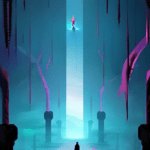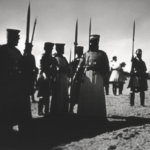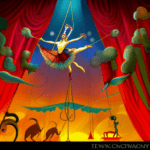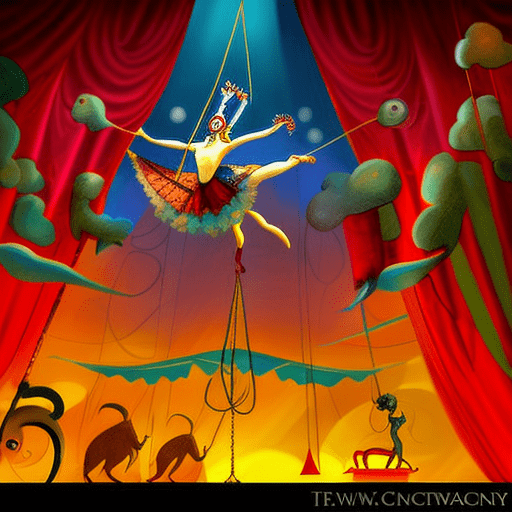One-line Summary:
Nights at the Circus is a captivating novel that explores themes of identity, freedom, and the power of storytelling through the extraordinary life of a half-woman, half-bird trapeze artist.
The Extraordinary Life of Fevvers
Nights at the Circus, written by Angela Carter, takes readers on a mesmerizing journey through the life of Sophie Fevvers, a larger-than-life character who claims to be part woman, part bird. Set in the late 19th century, the novel follows Fevvers’ adventures as a trapeze artist in a traveling circus, while also delving into her mysterious origins and the profound impact she has on those around her.
Born in a brothel in London, Fevvers’ unique appearance sets her apart from a young age. With her wings, she becomes the star attraction of Colonel Kearney’s Circus, captivating audiences with her daring acrobatics and enchanting personality. As the story unfolds, readers are introduced to a colorful cast of characters, including the journalist Jack Walser, who becomes infatuated with Fevvers and embarks on a quest to uncover the truth behind her extraordinary existence.
An Exploration of Identity and Freedom
At its core, Nights at the Circus is a thought-provoking exploration of identity and the quest for freedom. Fevvers, with her half-human, half-bird nature, embodies the struggle to define oneself in a world that often seeks to confine and categorize individuals. Through her experiences, the novel challenges societal norms and expectations, encouraging readers to question the boundaries imposed upon them and embrace their own unique identities.
As Fevvers navigates the complexities of her existence, she grapples with the tension between her human and bird-like qualities. This internal conflict mirrors the broader theme of personal freedom, as Fevvers seeks to break free from the constraints of her past and forge her own path. Through her journey, the novel raises profound questions about the nature of freedom and the power of self-determination.
The Power of Storytelling
Another prominent theme in Nights at the Circus is the transformative power of storytelling. Fevvers’ life is shrouded in mystery, and as the narrative unfolds, different versions of her origin story emerge. This exploration of narrative truth highlights the subjective nature of storytelling and the ways in which stories can shape our understanding of the world.
Throughout the novel, Carter weaves together elements of fantasy and magical realism, blurring the lines between reality and imagination. This blending of genres serves to emphasize the importance of storytelling as a means of creating meaning and connecting with others. Fevvers’ larger-than-life persona and the fantastical world of the circus serve as a backdrop for the exploration of the human experience and the power of storytelling to transcend boundaries.
Key Takeaways:
- Identity is not defined by societal norms but by embracing one’s unique qualities.
- Freedom is a constant pursuit, requiring individuals to challenge and break free from constraints.
- Stories have the power to shape our understanding of the world and connect us to others.
“The story is not all mine, nor told by me alone. Indeed, I am not sure whose story it is; you can judge better. But it is all one, long, last story, and if I were able to say it in a single sentence, I would be able to say it all.”
– Angela Carter, Nights at the Circus
In conclusion, Nights at the Circus is a captivating and thought-provoking novel that explores themes of identity, freedom, and the power of storytelling. Through the extraordinary life of Fevvers, readers are invited to question societal norms, embrace their unique qualities, and recognize the transformative potential of stories. Angela Carter’s vivid prose and imaginative storytelling make this book a must-read for those seeking a captivating and thought-provoking literary experience.












